Jeffrey M. Schwartz Famous Quotes
Reading Jeffrey M. Schwartz quotes, download and share images of famous quotes by Jeffrey M. Schwartz. Righ click to see or save pictures of Jeffrey M. Schwartz quotes that you can use as your wallpaper for free.
We are not passive recipients but active participants in our own process of perception" (Nancy Kanwisher)

In particular, if consciousness is an ontological fundamental-that is, a primary element of reality-then it may have the power to achieve what is both the best-documented and at the same time the spookiest effect of the m ind on the material world: the ability of consciousness to transform the infinite possibilities for, say, the position of a subatomic particle as described by quantum mechanics into the single reality for that position as detected by an observer. If that sounds both mysterious and spooky, it is a spookiness that has been a part of science since almost the beginning of the twentieth century. It was physics that first felt the breath of this ghost, with the discoveries of quantum mechanics, and it is in the field of neuroscience and the problem of mind and matter that its ethereal presence is felt most markedly today.

Each connection that neuroscientists forged between a neurochemical and a behavior, or at least a propensity toward a behavior, seemed to deal another blow to the notion of an efficacious will.

Freud elevated unconscious processes to the throne of the mind, imbuing them with the power to guide our every thought and deed, and to a significant extent writing free will out of the picture.
Decades later, neuroscience has linked genetic mechanisms to neuronal circuits coursing with a multiplicity of neurotransmitters to argue that the brain is a machine whose behavior is predestined, or at least determined, in such a way as seemingly to leave no room for the will. It is not merely that will is not free, in the modern scientific view; not merely that it is constrained, a captive of material forces. It is, more radically, that the will, a manifestation of the mind, does not even exist, because a mind independent of brain does not exist.

Use-induced cortical reorganization, says Taub, "involves alterations different from mere learning and memory. Rather than producing just increased synaptic strength at certain junctions, which is believed to underlie learning, some unknown mechanism is instead producing wholesale topographic reorganization." And more: we are seeing evidence of the brain's ability to remake itself throughout adult life, not only in response to outside stimuli but even in response to directed mental effort. We are seeing, in short, the brain's potential to correct its own flaws and enhance its own capacities.
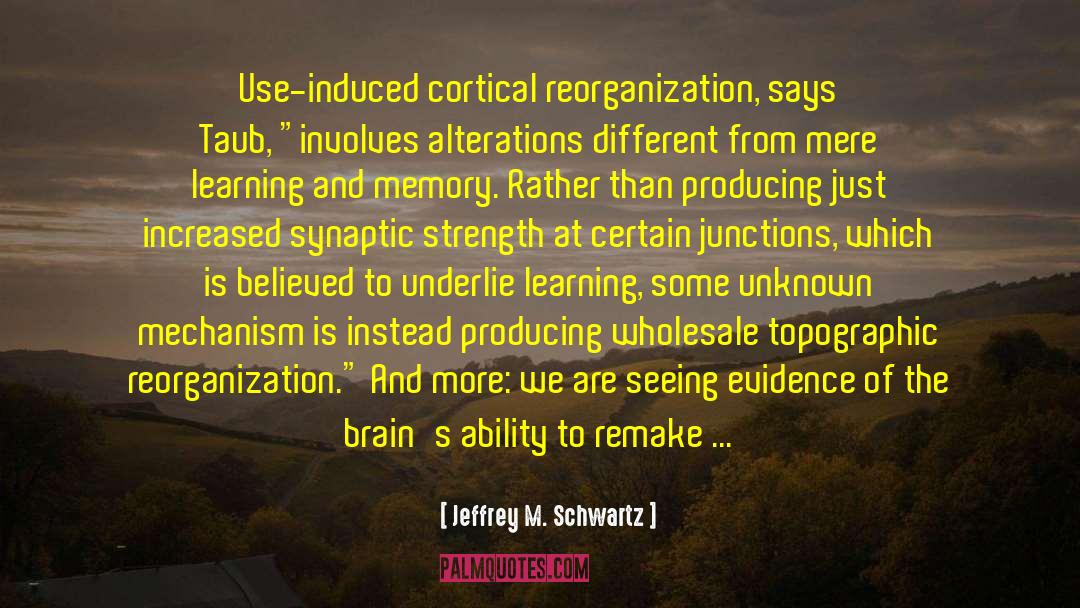
[T]he power of willful activity to shape the brain remains the working principle not only of early brain development, but also of brain function as an ongoing, living process.
![Jeffrey M. Schwartz Quotes: [T]he power of willful activity Jeffrey M. Schwartz Quotes: [T]he power of willful activity](https://palmquotes.com/author/jeffrey-m-schwartz-quotes-600281.jpg)
In ancient times, determinism rested on a belief in an omniscient God. Today, it is not old-time religion, but, rather, our culture's newfound faith - science - that challenges the belief in free will.

we cannot know what really happens, but only what we observe to happen.

PROCESS PHILOSOPHY, a school greatly influenced by Alfred North Whitehead, holds that mind and brain are manifestations of a single reality, one that is in constant flux. It thus is compatible with classical Buddhist philosophy, which views clear and penetrating awareness of change and impermanence (anicca in Pali) as the essence of insight. Thus, as Whitehead put it, "The reality is the process," and it is a process made up of vital transient "drops of experience, complex, and interdependent." This view is strikingly consistent with recent developments in quantum physics.
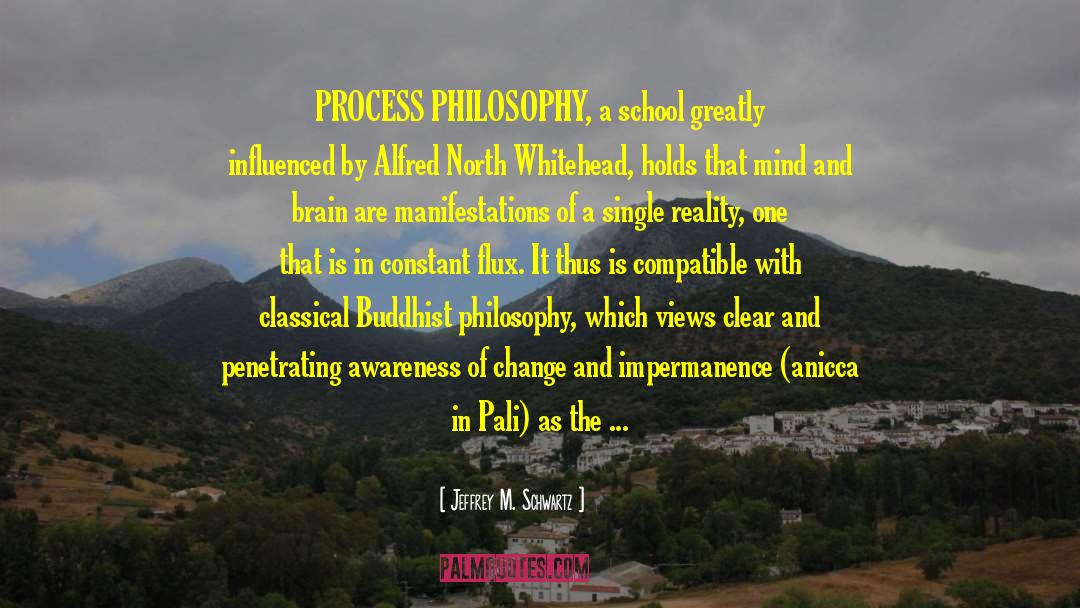
In a world described by quantum physics, an insistence on causal closure of the physical world amounts to a quasi-religious faith in the absolute powers of matter, a belief that is no more than a commitment to brute, and outmoded, materialism.

This is the textbook position on quantum mechanics and the nature of reality: that the Cartesian separation of mind and matter into two intrinsically different "substances" is false.
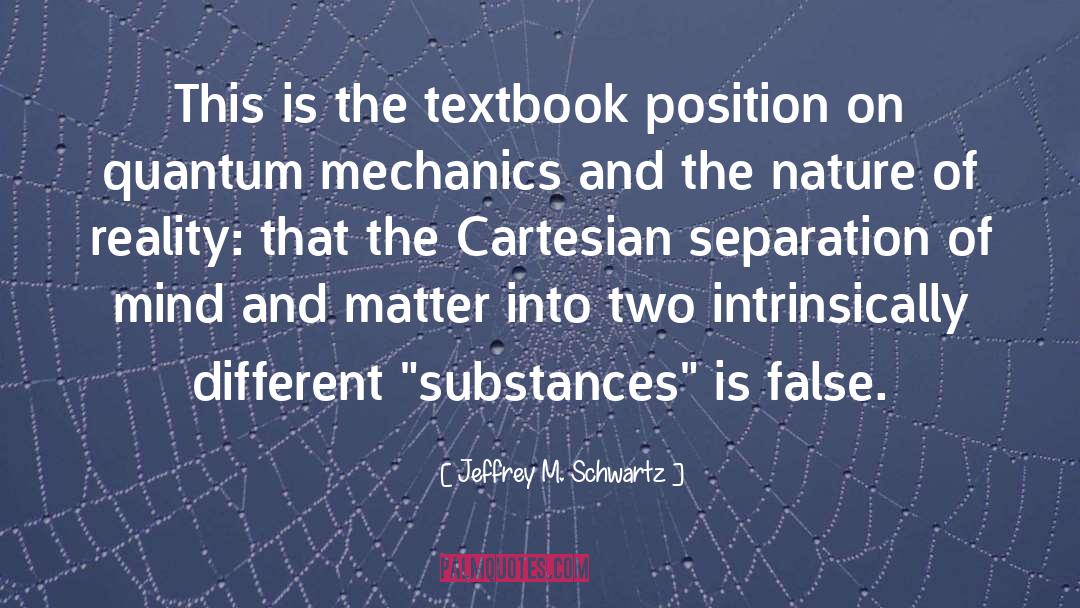
If there is to be a resolution to the mystery of how mind relates to matter, it will emerge from explaining the data of the human brain in terms of these laws-laws capable of giving rise to a very different view of the causal efficacy of human consciousness. Quantum mechanics makes it feasible to describe a mind capable of exerting effects that neurons alone cannot.

The brain, to be sure, is indeed the physical embodiment of the mind, the organ through which the mind finds expression and through which it acts in the world.

He (Rene Descartes) posited the existence of two parallel yet separate domains of reality: res cogitans, the thinking substance of the subjective mind whose essence is thought, and res extensa, or the extended substance of the material world. Mental stuff and material (including brain) stuff are absolutely distinct, he argued.

the harmful strategies used to avoid and escape those uncomfortable sensations vary depending on the content of the deceptive brain messages and the patterns you have developed to attempt to deal with distress. The range of possible responses is endless and includes feeding an addiction, getting into an argument, avoiding a situation, shutting out the world, or endlessly checking something.

One of Sherrington's greatest pupils, Sir John Eccles, held similar views. Eccles won a Nobel Prize for his seminal contributions to our understanding of how nerve cells communicate across synapses, or nerve junctions. In his later years, he worked toward a deeper understanding of the mechanisms mediating the interaction of mind and brain-including the elusive notion of free will. Standard neurobiology tells us that tiny vesicles in the nerve endings contain chemicals called neurotransmitters; in response to an electrical impulse, some of the vesicles release their contents, which cross the synapse and transmit the impulse to the adjoining neuron. In 1986 Eccles proposed that the probability of neurotransmitter release depended on quantum mechanical processes, which can be influenced by the intervention of the mind. This, Eccles said, provided a basis for the action of a free will.

Taking consciousness as a primitive rather than as an emergent property of the physical brain, Chalmers's search for a nonreductive ontology of consciousness led him to what he calls panprotopsychism. The proto reflects the possibility that the intrinsic properties of the basic entities of the physical world may be not quite mental, but that collectively they are able to constitute the mental (it is in this sense of proto that physics is "protochemical"). In this view, mind is much more fundamental to the universe than we ordinarily imagine. Panprotopsychism has the virtue of integrating mental events into the physical world. "We need psychophysical laws connecting physical processes to subjective experience," Chalmers says. "Certain aspects of quantum mechanics lend themselves very nicely to this.
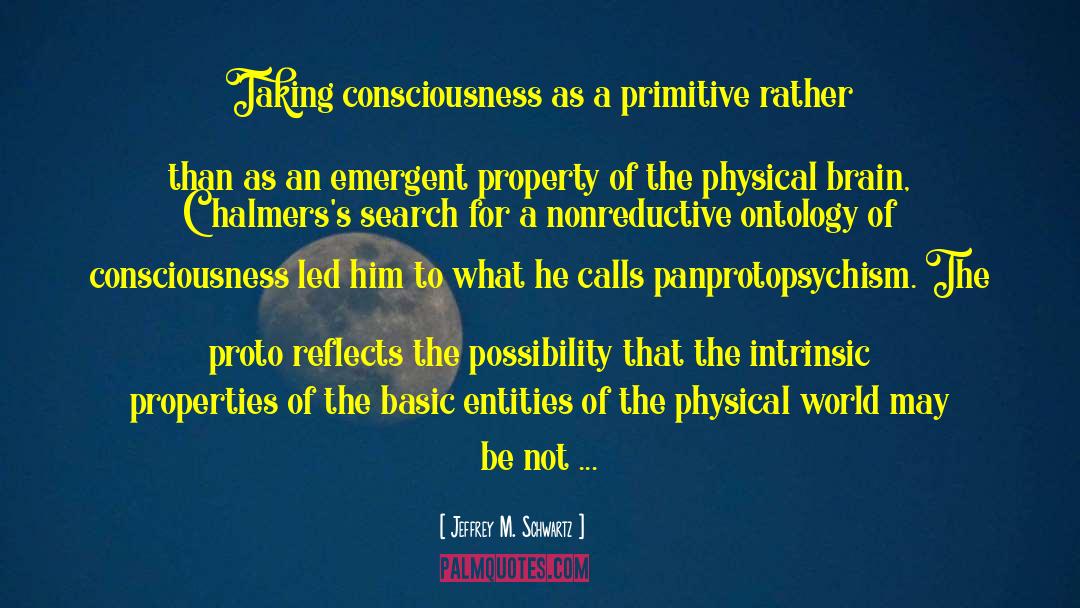
By exerting its will, Descartes declared, the immaterial human mind could cause the material human machine to move. This bears repeating, for it is an idea that, more than any other, has thrown a stumbling block across the path of philosophers who have attempted to argue that the mind is immaterial: for how could something immaterial act efficaciously on something as fully tangible as a body? Immaterial mental substance is so ontologically different-that is, such a different sort of thing-from the body it affects that getting the twain to meet has been exceedingly difficult. To be sure, Descartes tried. He argued that the mental substance of the mind interacts with the matter of the brain through the pineal gland, the organ he believed was moved directly by the human soul. The interaction allowed the material brain to be physically directed by the immaterial mind through what Descartes called "animal spirits"-basically a kind of hydraulic fluid.

The area of the brain devoted to the reading finger of expert Braille readers was much larger than that of the nonreading finger, or of either index finger in nonreaders, Pascual-Leone found. It was a clear case of sensory input increase, with the person paying close attention, leading to an expansion of the brain region devoted to processing that input.

Even this abbreviated rundown of mind-brain philosophies would not be complete without what the Australian philosopher David Chalmers calls "don't-have-clue materialism." This is the default position of those who have no idea about the origins of consciousness or the mind but assert that "it must be physical, as materialism must be true," as Chalmers puts it. "Such a view is held widely, but rarely in print." One might add that many working scientists hold this view without really reflecting on the implications of it.
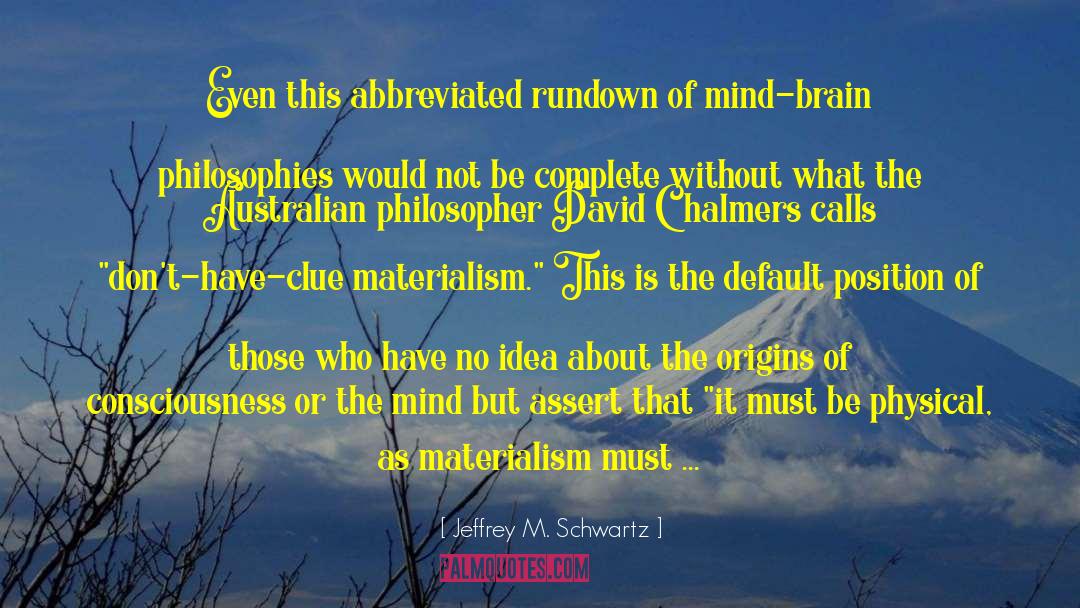
I tried to point out that it's not a gimmick to teach patients suffering with OCD that their intrusive thoughts and urges are caused by brain imbalances, and that we now know they can physically alter those imbalances through mindfulness and self-directed behavioral therapy techniques.

Let's begin with a quotation from mindfulness expert and teacher Bhante Henepola Gunaratana. It beautifully encapsulates what deceptive brain messages are, what they do to you, and how they keep you from following the path of your true self: We see life through a screen of thoughts and concepts, and we mistake those [thoughts] for reality. We get so caught up in this endless thought-stream that reality flows by unnoticed. We spend our time engrossed in activity, caught up in an eternal pursuit of pleasure and gratification and eternal flight from pain and unpleasantness. We spend all our energies trying to make ourselves feel better, trying to bury our fears, endlessly seeking security.16 To phrase it another way: We spend a considerable amount of our time engrossed in following deceptive brain messages until we begin to see them for what they are and value our true emotions and needs.
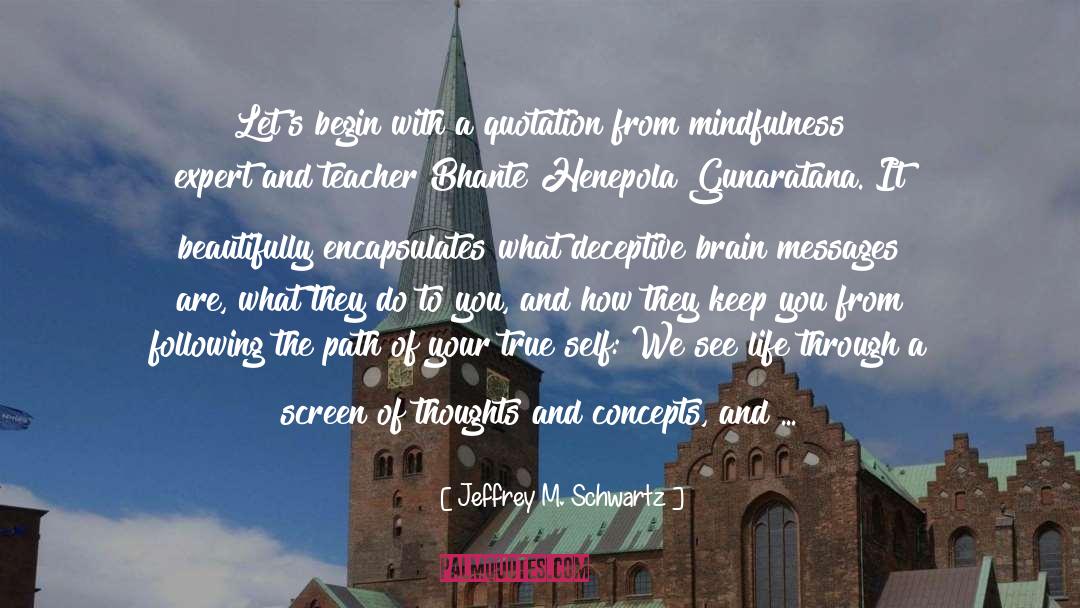
Intention governs attention, and attention exerts real, physical effects on the dynamics of the brain.

THE FOUR STEPS Step 1: Relabel - Identify your deceptive brain messages and the uncomfortable sensations; call them what they really are. Step 2: Reframe - Change your perception of the importance of the deceptive brain messages; say why these thoughts, urges, and impulses keep bothering you: They are false brain messages (It's not ME, it's just my BRAIN!). Step 3: Refocus - Direct your attention toward an activity or mental process that is wholesome and productive - even while the false and deceptive urges, thoughts, impulses, and sensations are still present and bothering you. Step 4: Revalue - Clearly see the thoughts, urges, and impulses for what they are, simply sensations caused by deceptive brain messages that are not true and that have little to no value (they are something to dismiss, not focus on).

Charles Sherrington, the founder of modern neurophysiology, contended in 1947 that brain processes alone cannot account for the full range of subjective mental phenomena, including conscious free will. "That our being should consist of two fundamental elements offers, I suppose, no greater inherent improbability than that it should rest on one only," he wrote.
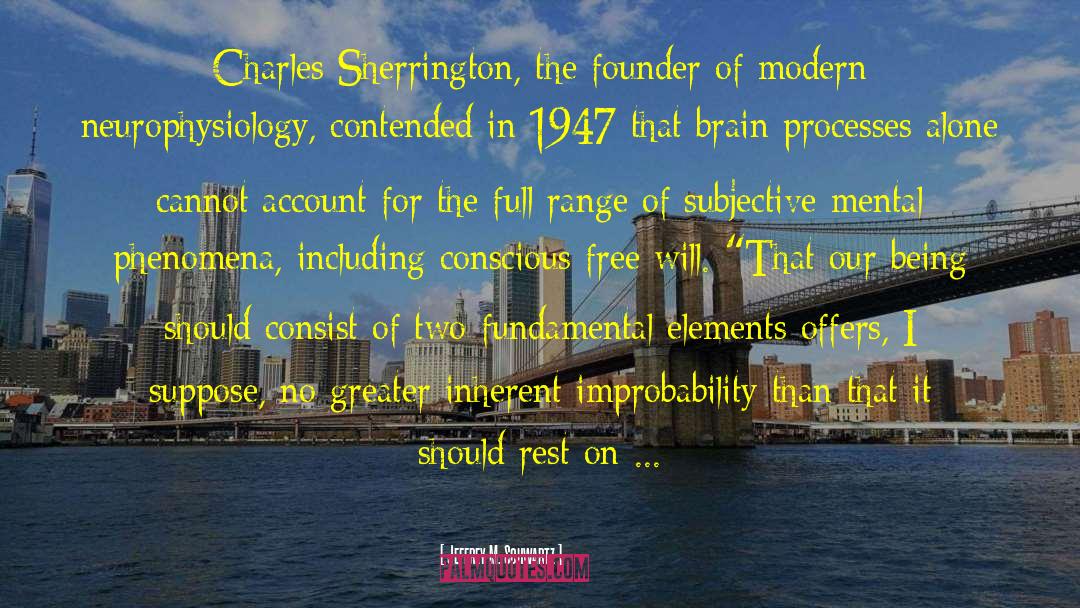
Like all of modern science, the field of psychiatry, especially in its current biological incarnation, has become smitten with materialist reductionism, the idea that all phenomena can be explained by the interaction and movement of material particles. As a result, to suggest that anything other than brain mechanisms in and of themselves constitute the causal dynamics of a mental phenomenon is to risk being dismissed out of hand.

The essential achievement of the will is to attend to one object and hold it clear and strong before the mind, letting all others-its rivals for attention and subsequent action-fade away like starlight swamped by the radiance of the Sun.

The life we lead, in other words, leaves its mark in the form of enduring changes in the complex circuitry of the brain-footprints of the experiences we have had, the actions we have taken. This is neuroplasticity. As Mike Merzenich asserted, the mechanisms of neuroplasticity "account for cortical contributions to our idiosyncratic behavioral abilities and, in extension, for the geniuses, the fools, and the idiot savants among us.
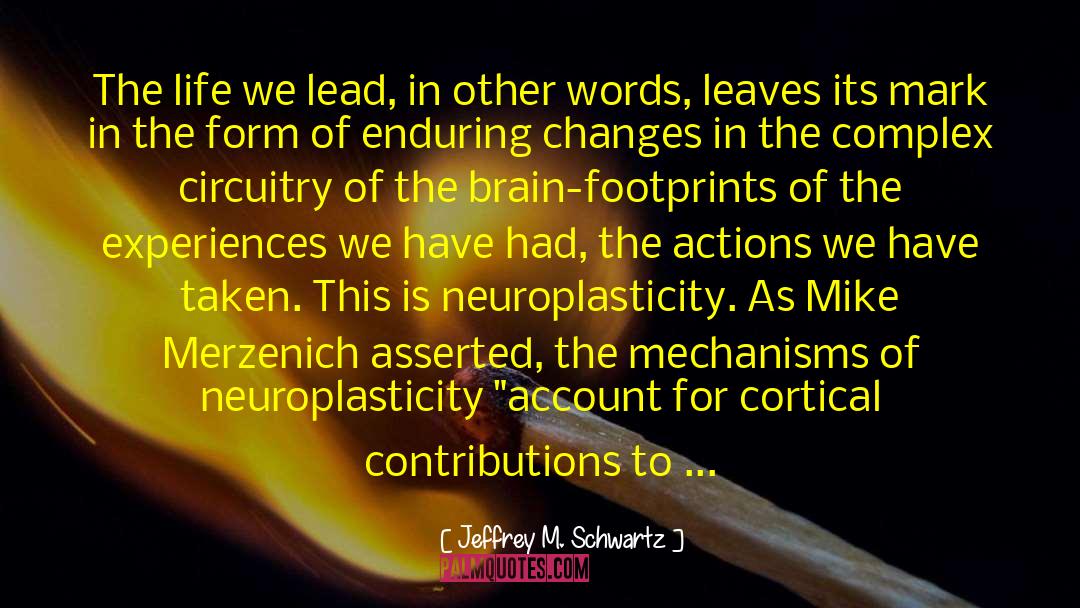
Carried to its logical limits, a system in which no one has a choice about what action to take is unworkable.

JOURNAL YOUR SUCCESSES To help you realize you truly are making progress, Steve gives this advice to people who are new to the Four Steps: "Write down the successes that you have early on because it encourages you to keep going. It's not always easy, but over the long haul, it does make a big difference and you will see how much progress you've made." The main point to keep in mind is that you want to focus on the things you have accomplished, no matter how small or inconsequential they seem to you. Do not minimize, ignore, or neglect even the most seemingly minuscule achievement. Rather,

